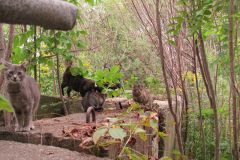(Felis catus)
Lauren Van Patter joined the research group as a Masters student in 2013 to investigate the lives of feral cats. Lauren’s project explores ferality and the nature of belonging through a case study of cats in Guelph, Canada. Feral animals are contentious and transgressive, falling somewhere between domesticated and wild. They are often actively exterminated, and are not acknowledged as having any natural habitat. Conflicts surrounding their management and the spaces they should occupy are widespread and complex. Feral animals are understudied within the animal geography scholarship, and therefore this project seeks to explore the conceptual, spatial, and ethical dimensions of human-feral cat relations.
As part of her Masters research, Lauren explored the social constructions of feral cats using semi-structured interviews, and the material lives of cats in feral colonies using field observations. The project employs a feminist-posthumanist conceptual framework and emphasizes non-human agency and place-making. Lauren’s research was generously funded by the Social Sciences and Humanities Research Council of Canada and an Ontario Graduate Scholarship.
Lauren's research on feral cats has contributed to efforts by the Guelph Cat Population Task Force, which facilitates community understanding and decision-making regarding cat overpopulation in the region. Specifically, Lauren assisted the task force in developing a survey tool to gather information on people's perceptions of feral cats and management strategies. The survey data were collected and analyzed by Natasha Edmunds who worked with our team as an undergraduate research assistant from Sept 2014 through April 2015.
Lauren successfully defended her thesis in April 2015 and received the Best Graduate Paper from the AAG Animal Geography Specialty group for her work. She presented a poster on Community Cats and their Management at the Community Engaged Scholarship Institute, University of Guelph showcase in downtown Guelph in March 2017.


